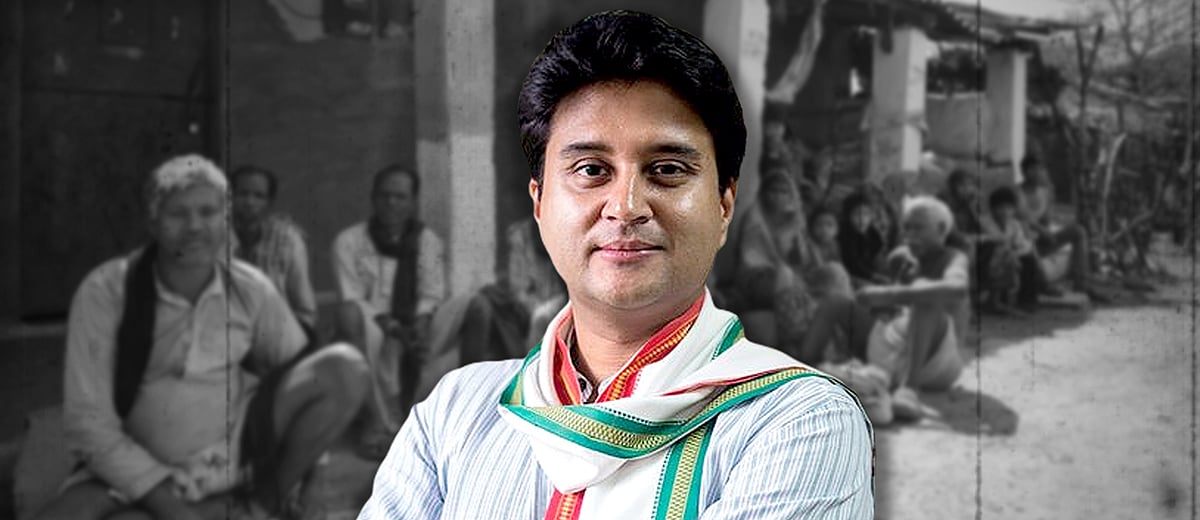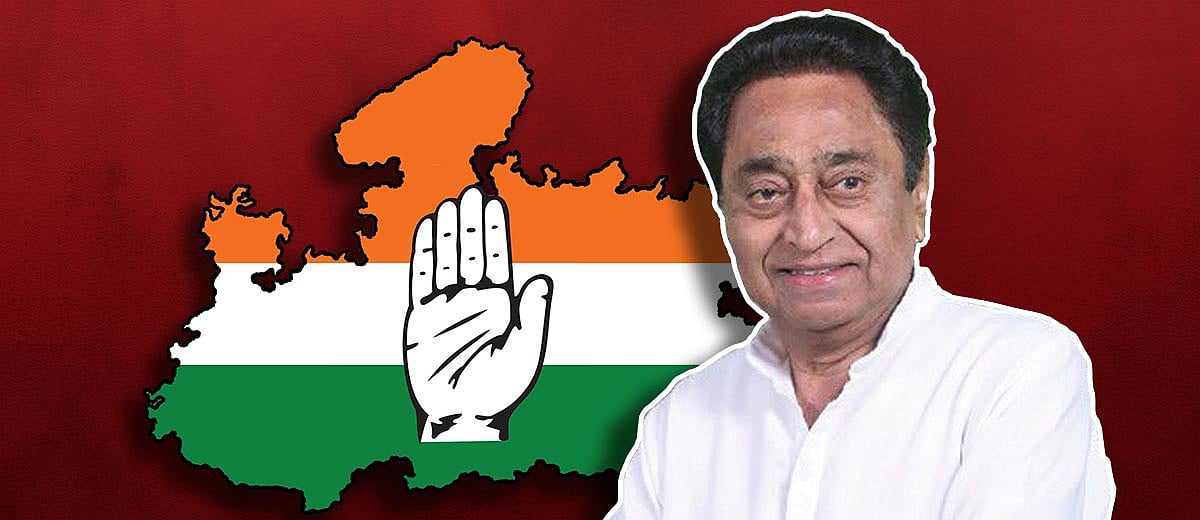Leadership, not ideology, drove Jyotiraditya Scindia from the Congress to the BJP
Patience is a political virtue, but not when it comes at the cost of realising one’s ambitions.
It was important, even if it sounded perfunctory. In his short speech yesterday at the Bharatiya Janata Party headquarters after joining the party, Jyotiraditya Scindia chose to explain his decision to leave the Congress in terms of the difference in the leadership of the two parties. He offered no grand ideological reasons, perhaps knowing that such an exercise holds little value for a leader’s support base, and even less for the ambition of a significant presence in power politics.
Amid many explanations for Scindia’s decision to leave the Congress, the most plausible ones are premised around the frustrations of an ambitious leader: tired of being young and waiting forever in a gerontocracy-driven party. That, of course, was aided by the frustration of being denied his share in power arrangements in the Congress-governed Madhya Pradesh, especially after his energetic campaign for the state’s 2018 Assembly poll.
What could have made Scindia persist with the party he was part of for the last 18 years? The only chance was if his bruised ego — suffered during the turf war with chief minister Kamal Nath and party veteran Digvijay Singh — could be tamed in favour of nurturing ambitions for the future.
This hope might have allowed him to make peace with the emotional costs of being overlooked for the positions of chief minister, state Congress president, and, more recently, the receding possibility of a Rajya Sabha nomination. Last year, his Lok Sabha seat loss in Guna only injected a sense of urgency, if not insecurity, to his course of action.
Amid mounting costs incurred for his association with the Congress, the benefits were drying up. The drift in the Congress’s central leadership, which appeared even more rudderless after Rahul Gandhi gave up the party presidency following the 2019 Lok Sabha poll debacle, only meant there was no respite in Delhi for Scindia’s woes in Bhopal.
For enduring this adversity, the lure of realising his political ambitions in any future power arrangement of the Congress was needed to make Scindia wait out the period. Somehow, it wasn’t in sight, and Scindia decided that waiting was no longer the political virtue of the young and ambitious within the Congress party.
Here, two things can be seen.
First, though it was during his formal membership acceptance speech, Scindia alluded to a basic flaw in the current approach of the Congress leadership. He talked about how the party had failed to grasp the nature of the political reality that the last two Lok Sabha elections brought to the fore. The massive mandates for the Narendra Modi-led BJP government at the centre were more about the popular approval of the prime minister’s strong leadership, and his ability to implement government programmes and policies. By stressing on the element of leadership, and not ideological battles, Scindia was reflecting on the key theme in current political attitudes of a decisive section of the Indian electorate.
Unlike what political scientists like Suhas Palshikar have argued, Scindia’s assessment is that it isn’t the appeal of a set of political beliefs, but the pull of a strong leadership that has shaped the BJP’s remarkable success in recent years. In other words, he was trying to convey that effective leadership, and not ideology, is the zeitgeist of the current polity.
Second, while the disillusionment with the central leadership appears to be Scindia’s point of departure from Congress, he still needs to come to terms with a different style of leadership in his new party. Being a product of the “inherited charisma” – to blend Max Weber’s explanation of different sources of authority – Scindia could hardly fault Rahul Gandhi’s dynastic claim to the top leadership of the Congress.
However, here’s what was worrisome for young turks like him. Despite being close to the first family of the Congress, Scindia could see the slow disappearance of a final arbiter or enforcer within the party. In situations that mattered to him, like the internal turf battles in the party in Madhya Pradesh, either central leadership was reluctant to help him, or its writ didn’t run in Bhopal. So, his proximity wasn’t delivering any political goods.
In the BJP, Scindia will now at least have the sense of final arbiters sitting at the top of the party hierarchy. If he’s confident of striking a rapport with the BJP’s top leadership, or convincing it of his utility, he can be sure of a smoother road to finding the role he’s eyeing. However, he will be equally aware of the cadre discipline, training, and loyalty that the BJP prides itself on. The party, in turn, will be watchful to make sure that finding a suitable role for Scindia isn’t seen as fast-tracking the royal family scion.
It’s interesting to recall that in its initial years, the Jan Sangh, the political predecessor of the BJP, was averse to aligning itself with former princes, members of royal families, and the big zamindars. Kingshuk Nag’s book, The Saffron Tide: The Rise of the BJP, describes how the Rashtriya Swayamsevak Sangh had objected to the merger between the Jan Sangh and the Hindu Mahasabha on this ground. The RSS had argued that the Hindu Mahasabha had diluted organisational purity by opening doors too easily for former royals and zamindars. It exhorted the Jan Sangh to distance itself from a feudal character.
It was only in the later part of the 1960s that Vijaya Raje Scindia, Jyotiraditya’s grandmother, contested on a Jan Sangh ticket in the 1967 Assembly election. She later became one of the pillars of the party in Madhya Pradesh. Along with Kushabhau Thakre who, decades later, also became BJP president, Rajmata Scindia’s role in expanding and consolidating the party’s reach in the region was significant.
Even Jyotiraditya’s father, Madhavrao Scindia, started his political journey with the Jan Sangh before switching to the Congress. His aunt, Vasundhara Raje Scindia, persisted with the BJP and rose to become chief minister of Rajasthan, while her sister Yashodhara Raje Scindia is a member of the Madhya Pradesh Assembly.
The BJP’s absorption of members from royal families was cautious during its Jan Sangh days, but it sought to mainstream the political capital they brought with them once they could stand the electoral test of popularity.
While the unfolding political drama in Madhya Pradesh is fraught with uncertainty over the survival of its Congress government, it can wait for its denouement . Irrespective of its outcome, Scindia’s exit from the Congress will get attention for its standalone value too. In many ways, it shows that patience ceases to be a political virtue in a party when it becomes shorthand for the surrender of ambition. The political careerist would seek a way out of such a midlife crisis.
The gerontocracy-stricken Congress can’t assume that waiting is an endless political art. The next few months will tell us how Scindia adapts himself to a different leadership culture in his new party – something that he identified as the prime driver of his decision.
 #MadhyaPradesh: They’ve voted for Scindias for decades, but receive poverty in return
#MadhyaPradesh: They’ve voted for Scindias for decades, but receive poverty in return The chief minister-in-waiting will finally get his crown
The chief minister-in-waiting will finally get his crown